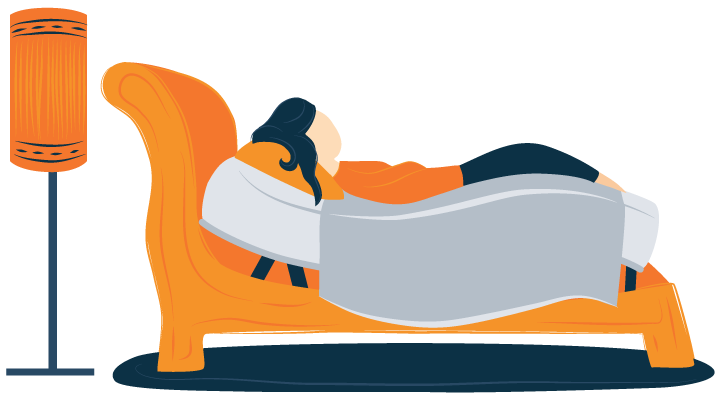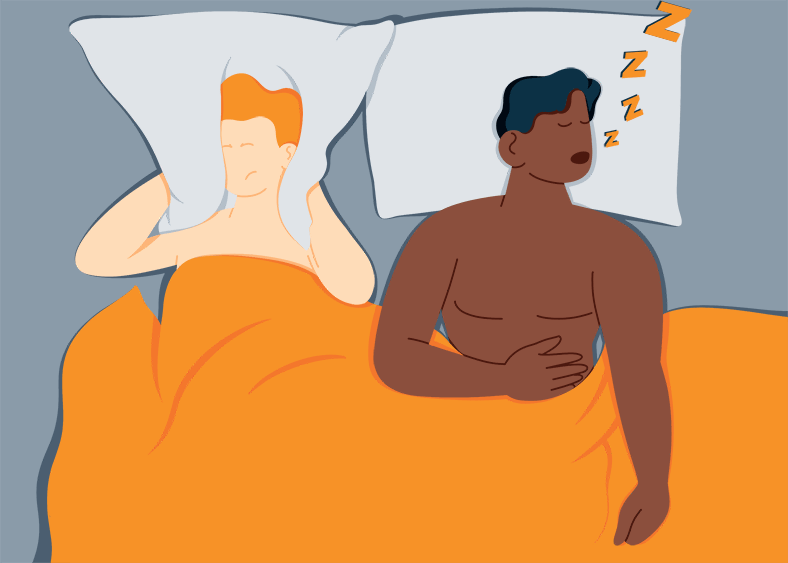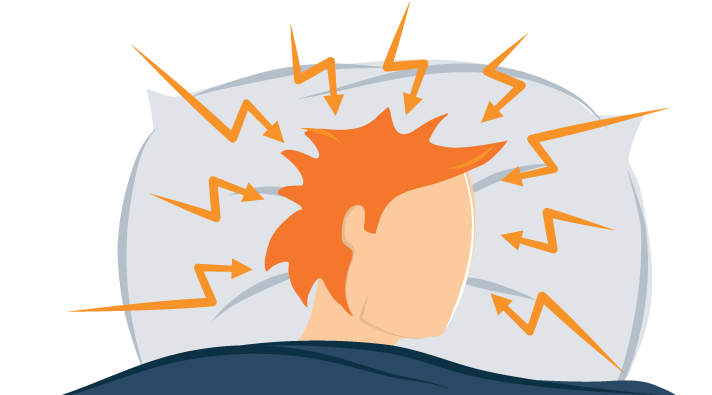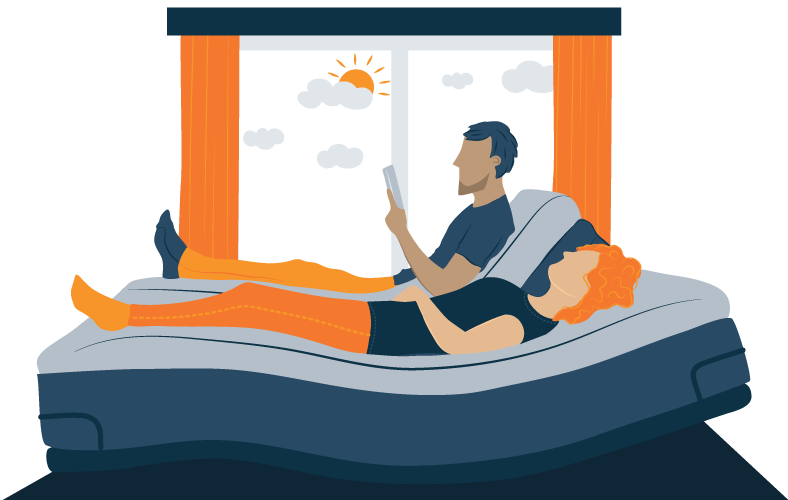Individuals who experience breathing issues during the night may need to re-evaluate how they’re positioned and consider sleeping on an incline. Lying flat could obstruct the airways of those who snore, have sleep apnea, deal with post-nasal drip, or find it difficult to breathe.
Raising your head during the night using a pillow, reclining bed, or riser could mitigate issues for those with chronic obstructive pulmonary disease (COPD), frequent snoring, migraine pain, and other problems. Opening up your airway by sleeping with your head elevated could help your breath pass through your airway with less obstruction, making it easier to breathe with less difficulty.
Semi-Recumbent Position
Semi-recumbent[1] refers to the head and upper body positioned at an incline of 30 to 45 degrees. Studies have shown that sleeping in a semi-recumbent position helps decrease sleep apnea severity[2]. Individuals who struggle with snoring or other breathing issues could find relief in this inclined position.
Resting on your back can cause gravity to pull down on your jaw, soft palate, and tongue, causing them to dip back towards your throat, narrowing your airway. The semi-recumbent position works to resolve this issue by opening up your throat. In fact, some professionals recommend that sleep apnea patients avoid the supine position[3] or lying flat altogether.
Sleeping while slightly elevated could improve not only sleep apnea and other breathing disorders but could mitigate heartburn, dark circles, and your nervous system. Additionally, individuals who have post-nasal drip and chronic obstructive pulmonary disease could benefit from a raised position as well. Here’s how:
End post-nasal drip
Post-nasal drip can significantly impair one’s ability to gain a good night’s sleep, but using an inclined bed could improve this condition. Adjustable beds are fantastic but expensive; if these happen to cost more than your budget, you could create an incline yourself by putting books under your headboard to create a subtle slope. This elevation should help open up your airway and let you recline in comfort.
Find COPD relief
Sleep disturbances resulting from trouble breathing is a common issue for those afflicted with chronic obstructive pulmonary disease (COPD). According to Anthem Health Insurance[4], the best way to keep airways open is to avoid lying down.
However, sitting upright isn’t often comfortable for sleepers. Individuals could try to ease this issue by resting at a slight incline, as this helps to keep air passageways open so you can get some rest.
Alleviate heartburn and acid reflux
Gastroesophageal reflux disease (GERD) is a digestive issue[5] that affects the ring of muscle between your esophagus and your stomach. GERD can often cause heartburn or acid indigestion, and if this flares up at night, it could be challenging to get some shut-eye.
According to Harvard Medical School[6], raising your torso so that your upper body is elevated should decrease heartburn or acid reflux symptoms. Gravity’s pull should make it more difficult for stomach acid to creep back into the esophagus, thus mitigating acid reflux symptoms.
Reduce snoring
If you have a partner who snores at night, salvation may be a 20-degree incline away. According to a 2020 study[7], “avoiding the supine position can reduce snoring in most habitual snorers.” Results showed snoring was successfully mitigated in 22 percent of individuals who slept at a 10-degree incline and stopped in 67 percent of those who slept at a 20-degree angle.
In addition to improving sleep problems, sleeping at an incline can help with the following:
Reduce dark circles
According to Cleveland Clinic[8], sleeping in a position where your head is low, like on your stomach or possibly side, can cause fluid to accumulate near your face and eyes, leading to puffiness and dark circles. Propping yourself up using an adjustable bed, foam wedge, or pillows could help fluid drain out of your face and disperse into the rest of your body evenly. This simple trick could help to minimize dark circles around your eyes and puffy skin in the face area.
Help the nervous system
The Central Nervous System (CNS) is made up of the brain and spine. Inclined Bed Therapy (IBT) is when someone sleeps at an angle to help alleviate certain medical conditions. This form of therapy could help those with CNS issues such as spinal cord injuries, multiple sclerosis, and cerebral palsy by reducing pressure on the spine and surrounding nerves.
The reason it helps is that during sleep, your glymphatic system[9] removes waste from the Central Nervous System. If you are waking up throughout the night, this process is interrupted and the waste will not be properly removed, exacerbating CNS issues[10].
For those who sleep more soundly on an incline, waste will be more efficiently removed from the brain, which can improve symptoms of certain CNS disorders[10].
Read More: Inclined Bed Therapy
How to Create an Incline for Sleep
1. Adjustable beds
Convenient adjustable beds often come with remote controls or adjustable settings, allowing you to customize the angle you sleep and rest to whatever feels comfortable. These can be excellent when recovering from injuries and terrific solutions for those who struggle with breathing issues or nervous system impairments.
Interested in exploring further? Check out our complete best mattress for adjustable beds guide.
2. Portable bed recliners
Bed recliners can come in a variety of formats, letting you adjust the angle at the push of a button or by manually adjusting the angle yourself. These handy portable recliners are designed to either sit under your mattress, pushing it up to the desired angle or behind a pillow, letting you snooze at a comfortable incline.
3. Wedge pillows
Buying a wedge pillow can be an affordable and simple alternative to buying a new bed while still having the benefits of an incline.
Wedge pillows generally range between 6 and 12 inches in height, and the height you choose will depend on what you’re using them for. For example, if you’re primarily using the pillow for low back pain or better circulation, you should find a wedge pillow that is about 6 inches in height.
On the other hand, if you’re using the pillow for health conditions like sleep apnea, heartburn, or snoring, you can choose a pillow that is between 7 to 9 inches high.
4. Bed Risers
Risers are often used in smaller bedrooms to raise beds to make space underneath for storage. However, they’re also great for creating an incline at the head of the bed. An aspect that is particularly nice about risers is that, when compared to pillows, they create a much more stable sleeping environment that shouldn’t shift in the night, letting users rest comfortably.
Last Word of Advice
Sleeping elevated may not be for everyone. Before doing so we recommend you consult a medical professional to properly assess your condition and situation to suggest a personalized, tailored solution.
When deciding to rest in an elevated position, it’s critical to remain aware of how it affects your body; if you wake up feeling more achy and stiff than you did before adjusting your posture, the change is likely not ideal for you. Further, those who sleep on their stomachs or sides shouldn’t sleep at an incline as it could cause painful hyperextension.
References
- Wang, Li., Li, Xiao., et. al. “Semi-recumbent position versus supine position for the prevention of ventilator-associated pneumonia in adults requiring mechanical ventilation”. National Library of Medicine. 2016.
- Basoglu, Ozen K., Keskin, Bengisu., Tasbakan, Mehmet Sezai., Gurgun, Cemil. “Effect of Semirecumbent Sleep Position on Severity of Obstructive Sleep Apnea in Patients With Heart Failure”. National Library of Medicine. 2015.
- Asp, Kevin. “How Your Sleeping Position Affects Obstructive Sleep Apnea”. American Association of Sleep Technologists. 2015.
- “Sleeping Tips for Better COPD Management”. Anthem Insurance. 2019.
- “Gastroesophageal reflux disease (GERD)”. Mayo Clinic. Last modified January 4, 2024.
- Godman, Heidi. “What’s the best sleep position to combat heartburn?”. Harvard Health Publishing. 2022.
- Wilhelm, Elisabeth., Crivelli, Francesco., et. al. “The anti-snoring bed – a pilot study”. BMC. 2020.
- “Dark Circles Under Eyes”. Cleveland Clinic. Last modified May 25, 2022.
- Jessen, Nadia Aalling., Finmann Munk, Anne Sofie., et. al. “The Glymphatic System: A Beginner’s Guide”. Neurochemical Research. 2015.
- Kaur, Jasleen., Fahmy, Lara M., et. al. “Waste Clearance in the Brain”. Frontiers. 2021.

Julia Forbes
Lead Product Tester
About Author
Julia is the Lead Reviewer at Sleep Advisor, specializing in testing out mattresses and sleep accessories – she’s in the right line of work, because she loves to sleep.
Stomach Sleeper




